
By Randy Moraitis, MA, CIP, BCPC
At the beginning of last year I set a goal to exercise everyday in 2016. I am happy to report that I achieved that goal and I learned a few things along the way that I would like to share with you.
There were two main reasons I initially made the goal. First, I wanted to set a good example for all of my counseling and coaching clients. My system of counseling and coaching includes a strong emphasis on health and wellness and I wanted to ensure that I was practicing what I was preaching!
Second, I have three little grandkids that I adore and I want to not only have tons of energy to play with them, but also be around for many years to see them grow up. Being physically fit gives me the best chance at accomplishing both of these intentions.
In order to stay healthy and avoid any overuse injuries I did a wide variety of fitness activities and workouts. This allowed adequate recovery time for any soreness from a particular workout and it also prevented any boredom from setting in.
The workouts I did included weight training, cardio (elliptical and stationary bike), kettle bells, martial arts, and walking. I also did yoga everyday–several days per week at a studio (You and the Mat) and other days at home. I kept a daily fitness log to track my training and ensure I was having a balanced approach.
Here’s what I learned from my yearlong exercise journey:
1. Mornings Are Best–By exercising in the morning I ensured that nothing and no one could chip away at my workout time. This meant getting up a little earlier, but it was totally worth it. When we work out later in the day there are so many things–work, family, emergencies– that can pop up and take away from our workout time. Get the workout done first thing in the morning–and if you have extra time in the afternoon or evening you can actually do another workout if you like. That’s what I did!
2. Weight Loss is More About What You Eat–If your goal is to lose weight (reduce bodyfat), then exercise is a great adjunct to that goal, but the amount and type of calories that you take in is very important. During my year of daily exercise I lost a total of 10 pounds. My fitness routine inspired me to eat healthy 90% of the time, but I still enjoyed treats on holidays and special occasions without worry because I knew I was working out so much. If my goal had been solely focused on the weight loss I would have had a stricter diet.
3. Physical Fitness is Good For Your Health–During this year of exercise I had fewer colds, flu or other sickness than any year I can remember. And the couple of times I felt like I was coming down with a cold, the sickness had a much shorter duration than previous years.
4. Exercise is a Great Stress Reducer–I have a very busy schedule. I am in private practice doing counseling, coaching and interventions, I run the nonprofit foundation CarePossible, and I lead the recovery program Lifelines that meets Fridays at The Crossing Church. Each of these pursuits means I am often dealing with individuals or families in crisis which can be stressful. Gratefully, the regular exercise leaves me feeling calm and relaxed everyday, even in the midst of stressful situations. If you are stressed out, I encourage you to add regular exercise to your routine!
5. Exercise Provides Opportunities for Other Healthy Growth–I love a good win/win situation and fitness activities provide a lot of opportunities for win/wins. While on cardio machines you can read books or watch TED Talks, while walking outdoors you can listen to audiobooks or lectures from The Great Courses, while taking fitness or yoga classes you can make friends and get healthy social support and connectivity.
Bottom Line–Regular exercise is great for both your mind and your body in so many ways. So, no excuses! If a busy, old guy like me can workout every day for a year, then you can work out at least a few times per week. I urge you to make this a year of health and fitness so you can reap all the rewards of a fitness lifestyle. If you need help getting started I love to do wellness coaching and would be honored to work with you. And will I exercise everyday in 2017? I’m not sure, but I haven’t missed a day yet!
Call me at 949-303-8264 or email me at randy@randymoraitis.com.
Websites: www.carepossible.com, www.randymoraitis.com.
About Randy Moraitis
Randy is married to Kim and they live in Laguna Niguel. Together they have a blended family of five adult children and three beautiful grandchildren. (If you don’t believe Randy, he will gladly show you pictures!) Randy is a Certified Intervention Professional (CIP) and expert in helping families and individuals affected by addiction and/or mental health issues. He is a Board Certified Pastoral Counselor and is both licensed and ordained as a pastoral counselor. He has five professional coaching certifications and loves working with clients on executive coaching, life coaching, wellness coaching and recovery coaching. Randy has a master’s degree with emphasis in theology and counseling, a bachelors degree in management and leadership, and a certificate in health and fitness with emphasis in exercise physiology and sports psychology from UC Irvine. He has been helping groups, individuals and families get mentally, physically and spiritually healthy in Orange County for over 25 years.
 As a counselor, coach and interventionist I am fascinated by the habits and disciplines that help people live healthy and successful lives. That is why I just love this infographic that I found on success.com. Here is a link to their original post: 13 Daily Habits of Highly Successful People.
As a counselor, coach and interventionist I am fascinated by the habits and disciplines that help people live healthy and successful lives. That is why I just love this infographic that I found on success.com. Here is a link to their original post: 13 Daily Habits of Highly Successful People.





